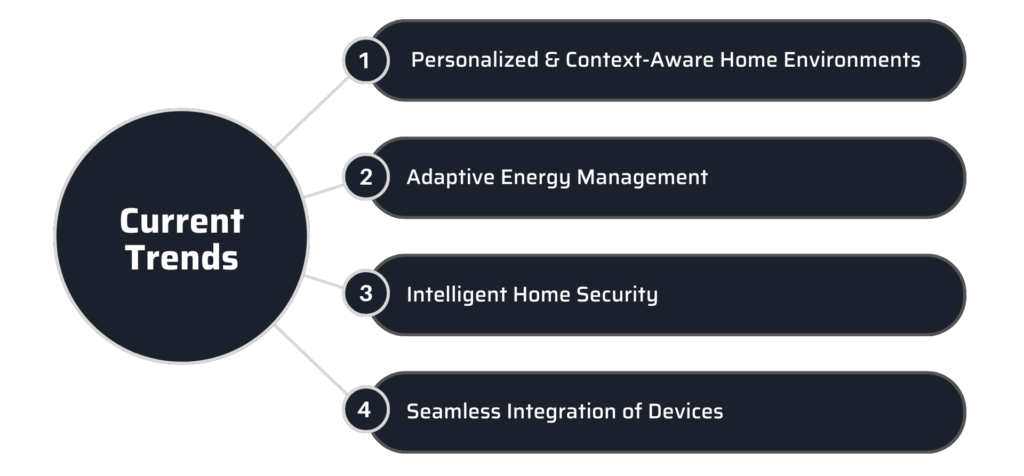Generative AI for Smart Home Automation: Current Trends and Future Directions
Smart home automation has transformed from a niche market into a mainstream phenomenon, enhancing convenience, energy efficiency, and security in our homes. With technological advancement, Generative AI is poised to redefine the smart home experience by creating environments that are not only adaptive but also intuitively responsive to their inhabitants’ needs. We can expect significant personalization, security, and overall functionality advancements by integrating generative AI into smart home automation. Traditional smart home devices often operate based on predefined settings and schedules, limiting their adaptability to user needs. However, by leveraging generative AI, smart home systems can evolve and learn from user behaviors, preferences, and routines.

Current Trends in Generative AI for Smart Home Automation
Personalized & Context-Aware Home Environments
Generative AI is transforming the way of smart home systems customize the environments. Traditional smart home systems rely on pre-set routines and user inputs to control devices like thermostats, lights, and security cameras. In contrast, generative AI can analyse user behaviour and preferences to create highly customized environments. For instance, smart thermostats equipped with generative AI can learn from your daily routines, adjust temperature settings based on your comfort preferences, and even anticipate changes based on external factors such as weather forecasts. This level of personalization enhances comfort and efficiency, making smart home systems more intuitive and responsive.
Adaptive Energy Management
Energy efficiency is a primary focus of smart home technology, and generative AI is crucial in improving energy use. By examining energy usage patterns along with factors such as weather and occupancy, generative AI can develop flexible energy management plans. AI-driven systems can generate optimal heating and cooling schedules that predict peak energy consumption times and adjust settings accordingly. This not only reduces energy costs but also contributes to environmental sustainability by minimizing unnecessary energy consumption.
Intelligent Home Security
Generative AI is significantly enhancing home security through advanced monitoring and response systems. Traditional security systems typically depend on set rules and fixed alerts, which may restrict their overall effectiveness. Generative AI, however, can create dynamic security protocols by analysing real-time data from various sensors, cameras, and devices. For example, AI can generate predictive models to identify unusual patterns of activity, such as potential break-ins or unusual movements, and automatically adjust security settings or alert homeowners. This proactive approach improves overall security and reduces the risk of false alarms.
Seamless Integration of Devices
The integration of various smart devices is a common challenge in home automation. Generative AI can streamline this process by creating adaptive integration solutions that ensure seamless communication between devices. For instance, AI can generate integration models that connect different brands and types of smart devices, allowing them to work together harmoniously. This capability enhances the overall functionality of smart home systems, making it easier for users to manage and control their devices from a single interface.

Future Directions for Generative AI in Smart Home Automation
Intuitive Predictive Capabilities
The future of generative AI in smart home automation will likely see even more advanced predictive capabilities. By harnessing vast amounts of data and sophisticated algorithms, AI systems will be able to generate highly accurate predictions about various aspects of home life. For example, future AI-driven systems could predict maintenance needs for appliances based on usage patterns and generate proactive maintenance schedules. Similarly, AI could forecast changes in household routines and adjust home settings in anticipation of those changes, further enhancing convenience and efficiency.
Human User Interaction and Engagement
Generative AI is expected to revolutionize user interaction and engagement with smart home systems. Voice assistants and chatbots powered by generative AI will become more conversational and capable of understanding nuanced user requests. Future systems might generate personalized responses and suggestions based on individual preferences and past interactions. For instance, an AI-powered voice assistant could generate recommendations for optimizing home automation settings based on your current mood or activity. This level of interaction will make smart home systems more intuitive and user-friendly.
Integration with Emerging Technologies
The integration of generative AI with emerging technologies will open new possibilities for smart home automation. For example, the combination of generative AI with augmented reality (AR) could enable users to visualize and interact with their smart home systems in entirely new ways. Imagine using AR glasses to see a virtual overlay of your home automation settings, allowing you to adjust in real-time. Similarly, integration with blockchain technology could enhance security and privacy by generating secure, decentralized systems for managing smart home data.
Adaptive Health and Wellness Solutions
Generative AI has the potential to drive advancements in health and wellness within smart homes. Future systems could generate personalized health and wellness plans based on data from wearable devices and smart home sensors. For example, AI could analyse sleep patterns, physical activity, and environmental factors to generate recommendations for improving sleep quality or overall well-being. This capability would turn smart homes into proactive wellness hubs, supporting healthier lifestyles and well-being for residents.
To sum up, Generative AI is composed to shape the future of smart home automation in profound ways. From personalized environments and adaptive energy management to intelligent security and context-aware automation, the current trends highlight the transformative potential of this technology. Looking ahead, advancements in predictive capabilities, user interaction, and integration with emerging technologies will further enhance the functionality and user experience of smart home systems. As we move forward, it is essential to balance innovation with ethical considerations, ensuring that generative AI contributes positively to the future of smart home automation. The journey ahead promises to be exciting, as generative AI continues to unlock new possibilities and redefine how we interact with our homes.
At MosChip, our AIML expertise enables enterprises to fully realize the potential of artificial intelligence across edge, cloud, and generative AI. Our end-to-end services, right from R&D to development, deployment, and testing boost efficiency, enhance decision-making, and unlock new opportunities, ensuring that AI solutions are impactful.
Author
-

Rakesh Nakod is a Principal Engineer at MosChip. He is proficient in AI and has experience in developing and deploying AI solutions across computer vision, NLP, audio intelligence, and document mining. He also has vast experience in developing AI-based enterprise solutions and strives to solve real-world problems with AI. He is an avid food lover, passionate about sharing knowledge, and enjoys gaming, and playing cricket in his free time.







